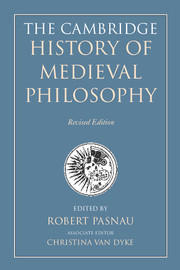Book contents
- Frontmatter
- Contents of Volume 1
- Preface
- List of contributors
- Frontmatter
- Contents of Volume 2
- Introduction
- I Fundamentals
- II Logic and language
- III Natural philosophy
- IV Soul and knowledge
- V Will and desire
- 29 Freedom and determinism
- 30 Intellectualism and voluntarism
- 31 Emotion
- 32 Weakness and grace
- VI Ethics
- VII Political philosophy
- VIII Metaphysics
- IX Theology
- Appendices
- Bibliography of primary sources
- Bibliography of secondary sources
- Index nominum
- Index rerum
- References
30 - Intellectualism and voluntarism
from V - Will and desire
Published online by Cambridge University Press: 05 August 2014
- Frontmatter
- Contents of Volume 1
- Preface
- List of contributors
- Frontmatter
- Contents of Volume 2
- Introduction
- I Fundamentals
- II Logic and language
- III Natural philosophy
- IV Soul and knowledge
- V Will and desire
- 29 Freedom and determinism
- 30 Intellectualism and voluntarism
- 31 Emotion
- 32 Weakness and grace
- VI Ethics
- VII Political philosophy
- VIII Metaphysics
- IX Theology
- Appendices
- Bibliography of primary sources
- Bibliography of secondary sources
- Index nominum
- Index rerum
- References
Summary
The terms ‘intellectualism’ and ‘voluntarism’ classify theories of moral psychology and of ethics according to whether primary importance is placed on the intellect or the will in human agency. Though classical and early medieval moral theories have a notion of willing as an act of desire (whether rational or not), they lack a concept of the will as a power of the soul distinct from the intellect and from the sense appetite. Only in the later Middle Ages, when the will is thus conceived as a distinct power of the soul, do the classifications of intellectualism and voluntarism properly apply.
Although intellectualism and voluntarism are apt terms for describing the extreme viewpoints, not every writer fits neatly into one of the two main camps, since there are considerable differences among them when it comes to the details of their moral psychology and ethics. An author may, for instance, have both intellectualist and voluntarist tendencies in different respects, or may consider the activities of intellect and will as so intertwined that these classifications become useless.
Historically, this split originated from specific innovative questions which were made a litmus test for a successful defense of human freedom; the fundamental issue was not whether human beings are free, but whether intellect or will is ultimately responsible for their freedom. This chapter focuses on the period in which these discussions among Latin authors were most heated and philosophically most fruitful – namely, from the late 1260s until the early 1300s – a time when ecclesiastical interventions were exacerbating the division. It concludes with some reflections on the wider implications of these rival accounts of human freedom for alternative views of human psychology and ethics.
- Type
- Chapter
- Information
- The Cambridge History of Medieval Philosophy , pp. 414 - 427Publisher: Cambridge University PressPrint publication year: 2014
References
- 6
- Cited by

